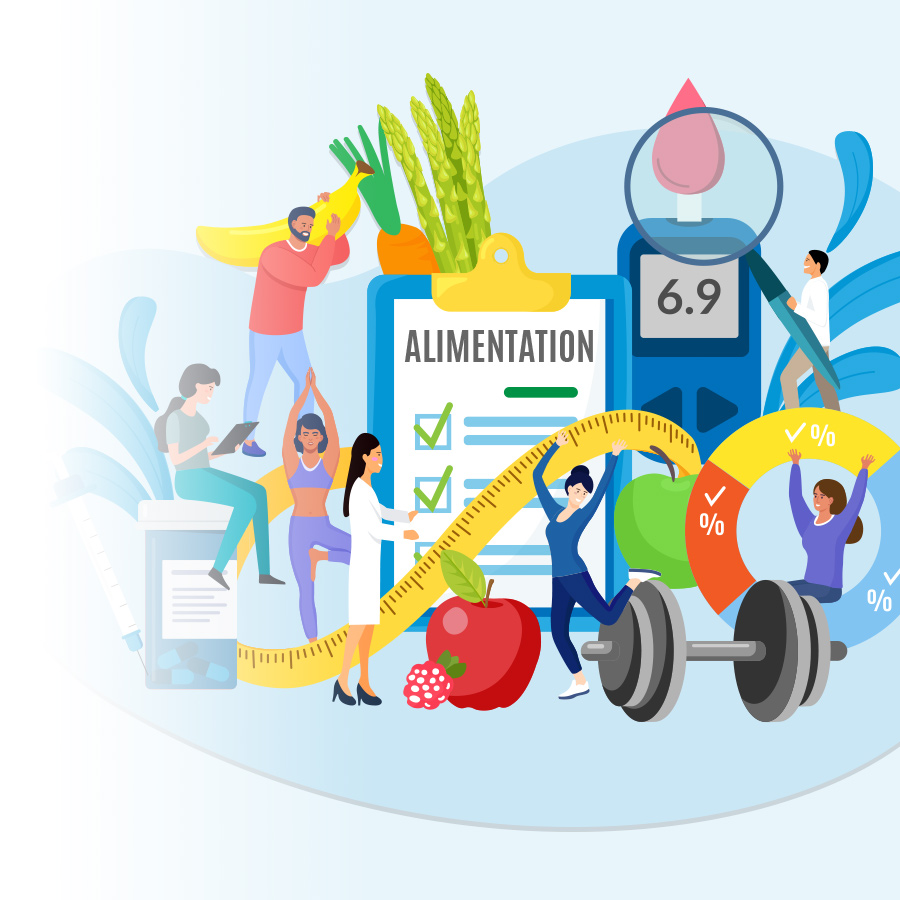If you or a loved one is living with diabetes, or if you are simply curious about the disease, the following may be of interest to you.
Diabetes: a disease related to blood-glucose
Diabetes is a disease characterized by the body’s inability to properly metabolize the sugar that fuels the body's cells. This results in elevated blood glucose (sugar levels in the blood). Frequent and prolonged exposure to high blood sugar (hyperglycemia) is responsible for the medical consequences of diabetes.
Every effort must be made to normalize blood glucose levels and there are many ways to do this.
There are many issues related to diabetes and each one deserves special attention. Here is some information on some important aspects of this disease.
Lifestyle
Choosing a healthy lifestyle is one of the most effective strategies for achieving optimal blood glucose control. Eating well, reducing sugar and fat intake, losing weight, and increasing physical activity are also recommended strategies to achieve your blood glucose goals and better health.
People living with diabetes should refrain from smoking to stay healthy. Smoking increases the risk of complications from diabetes, especially because of its effects on the heart, blood vessels and other organs. This increases the risk of death.
Read the following tips for additional information on lifestyle changes:
- Diabetes: made-to-measure nutrition
- Diabetes: how to choose snacks
- The benefits of physical activity on diabetes
- Your pharmacist's role in smoking cessation
Medication
Another very effective way to normalize blood glucose levels is to use medication to treat diabetes. Oral anti-diabetic drugs (taken by mouth) are particularly suitable for people with type 2 diabetes. However, they are not useful for those with type 1 diabetes, who will have to turn to insulin as their treatment of choice.
That said, some people with type 2 diabetes will also need to include insulin in their daily routine. Other medications that are also available by injection can sometimes be used by people with type 2 diabetes. For additional information about the medications for diabetes, read the following texts:
- Type 2 diabetes and oral medication
- Diabetes: the role of insulin
- Better managing diabetes using an insulin pump
- Prevent, detect and manage hypoglycemia
Blood glucose monitoring
People living with diabetes have to monitor their blood glucose levels. Self-monitoring of blood glucose (SMBG) involves measuring and monitoring blood glucose levels with a capillary blood glucose meter, using a fingertip blood sample. This allows for the tracking of changes in blood glucose levels, the assessment of the effect of certain factors on blood glucose levels, and the making of changes to bring blood glucose levels back into balance, such as adjusting the dosage of medications.
Technologies are now available to help people living with diabetes monitor their blood glucose levels on a continuous basis without the need for a finger prick. These technological advances provide access to easier and closer monitoring. Blood glucose monitoring is a critical part of good diabetes management. For more information, read the following tips:
A way of life
It is true that living with diabetes can sometimes be a daily challenge. For many people, having diabetes means adapting their lifestyle to this new reality. But don’t worry, with the right information and the right management, there’s no reason for it to interfere with your daily activities. For more information on how to cope with diabetes on a daily basis, read the following advice:
- Optimal diabetes management
- Solutions for the inconveniences of diabetes
- Managing diabetes at school: a team effort
- Diabetes and travel
Diabetes and cardiovascular health
One of the major issues of diabetes is the prevention of cardiovascular disease. Diabetes, especially if poorly controlled, predisposes an individual to developing certain heart and vessel diseases such as myocardial infarction (heart attack) or stroke. If your cardiovascular health is important to you, the following advice will also interest you:
In sum, it’s up to you to find the ways to limit the impact of diabetes on your life! Pharmacists are always there to give you advice, so don’t hesitate to speak to them.

